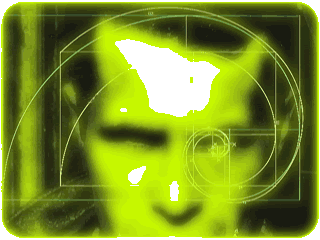
For many people, the 1960s conjure up images of playful hippie Flower Children grooving to the Beatles' "All You Need is Love." But it's the dark side of the 1960s, the bloodletting and ritualized violence more aptly conveyed by the Rolling Stones' "Sympathy for the Devil," that one finds in the work of avant-garde filmmaker Kenneth Anger, who will be profiled tonight on the Independent Film Channel's Split Screen.
In the hope of raising funds for a full-length documentary on Kenneth Anger, filmmaker Jon Ausbrooks has put together the mini-documentary Inside the Eye of 'Scorpio Rising.' The densely-packed 11-minute short, presented in triple-split-screen format, features a latter-day Anger deconstructing his highly influential film Scorpio Rising, a cinema verité portrait of Brooklyn biker culture set to early '60s girl-group songs like "My Boyfriend's Back."
Running a scant 30 minutes, Anger crafted in Scorpio Rising the prototype for both MTV-style music videos and reality TV. His epochal underground film laid out a new cinematic language and aesthetic composed of irony-laden voyeurism, minute attention to detail, kitschy music, and the campy gay gaze Anger brought to all his cinematic subjects.
"Scorpio Rising has had an impact on filmmakers like Paul Schrader, Martin Scorsese, and I think David Lynch as well," comments Ausbrooks, who has spent the last two years cultivating a relationship with the reclusive Anger, now 72.
After completing such films as Eaux d'artifice (1953) and Inauguration of the Pleasure Dome (1954) while on a 12-year stint in Europe, Anger returned to the states in 1963. He cannily insinuated himself into the studded, leather-jacketed, and very butch biker culture of Coney Island Italian-Americans. He chronicled their activities, focusing particularly on a biker named Scorpio who is filmed lounging in bed and then engaging in minute, ritualized preparations for a biker party. In fact, the film's title is a double entendre, referring both to Scorpio's "rising" from bed and to Kenneth Anger's own astrological orientation as an Aquarian with Scorpio Rising.
In Ausbrook's documentary, Anger comments on the fastidious yet unarticulated kinkiness of his biker subjects, who devoted most of their free time to fine-tuning their bikes and dressing up in leather road gear. "They were what I call unconscious natural fetishists," Anger remarks, "Although if I had said that to them they would have maybe punched me out, or at least they would have not known what I was talking about."
Anger followed the bikers first to a Halloween party which, when filtered through his lens, comes off as a homoerotic orgy of fun-loving sadism -- then it's on to a bike race in upstate New York, where he captured the death of one biker whose machine spilled over in the mud.
"It was a fitting end to Scorpio Rising," Anger points out, "because the sign of Scorpio refers to sex and death, and it also rules machines -- because sex organs are the machines of the human body."
Soon after making Scorpio Rising Anger headed for the West Coast, where he continued his fetishistic documentation of the burgeoning counterculture. In 1967, at the tail end of the Summer of Love in San Francisco's Haight-Ashbury, Anger shot another short film entitled Invocation of My Demon Brother, a combination light-show and satanic mass. Mick Jagger (heavily immersed in his late-decade demon incarnation) contributed the eerie, disconcerting sounds to Invocation, and the ceremonies were also conducted by future Manson family member Bobby Beausoleil.
Anger's intersection with the Rolling Stones clique culminated in his last film, Lucifer Rising (1973), in which Anger himself played Lucifer opposite Mick Jagger's then flame Marianne Faithfull.
Protective of Anger's public image, Ausbrooks is quick to pounce on those who would pigeonhole him as your garden-variety gay, underground, satanic '60s filmmaker with a Nazi regalia fetish. "A more incisive term to use in describing Anger is Luciferian," Ausbrooks cautions, "It's the idea of Lucifer as a higher aspect of yourself that you need in order to invoke free will, or in a wider sense the hermetic path to achieve your holy guardian angel."
Oh, well, no cause for alarm, then.
IFC's Split Screen presentation of In the Eye of 'Scorpio Rising' debuts Monday, September 27th, at 8 p.m. PT.
Peter Braunstein writes about film and pop culture for the Village Voice, and is currently co-editing an anthology on the 1960s counterculture.
